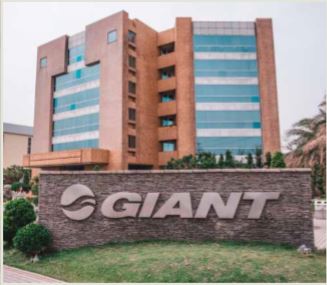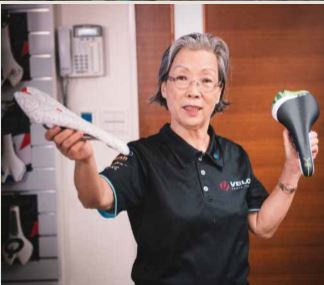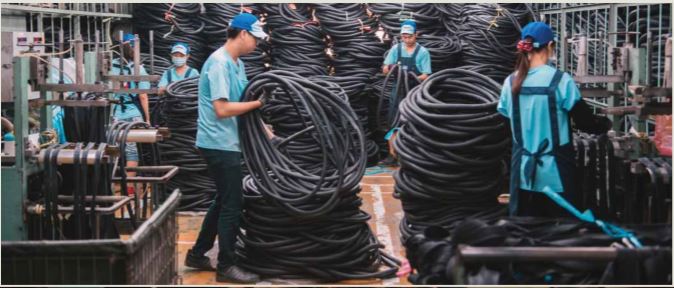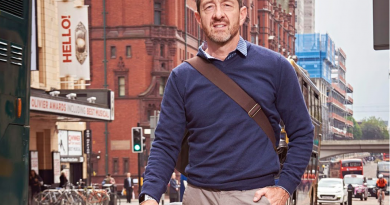Focus: Taichung as a trendsetter for the bike industry?
There is hardly any bike to be found without a component produced in Taiwan. Over the past 50 years, the Pacific Island has not only developed into an important centre of bike production, but also into a trendsetter for the whole bike industry. Werner-Müller-Schell provides a glimpse behind the scenes of the Taiwanese bicycle capital.
At first glance, Taichung appears a stereotypical modern Asian metropolis. Skyscrapers veiled in clouds of smog are found in close proximity of industrial corrugated sheet iron halls, and expensive stores are located next to small street shops. Narrow streets lead from major transit routes filled by innumerable motor scooters and crowds of people purchase products on the exotic night markets. Nearly three million inhabitants live in the catchment area of the metropolitan city which is located close to the Taiwanese West Coast. After Kaohsiung and Taipei, Taichung is the third largest city of the Pacific Island.
A closer look into Taichung through the eyes of a bike lover suggests that the bicycle plays a more significant role than the streets dominated by scooters might indicate: The arguably best known name associated with the city is Giant, the largest bicycle manufacturer in the world, established 46 years ago.
Although, situated in a considerable factory complex of about 67 million square metres in the north-western Dajia district, Giant is not the only bike brand in this region: All in all, there are more than 200 companies based in Taichung and they are all attributed to the bike industry, producing rims, seat posts, stems as well as complete bikes. 
“One could really say that Taichung can be considered the Detroit of the bike industry,” states Micki Kozuschek, founder and CEO of Lezyne. The American manufacturer for lights, bike pumps and tools owns a complete factory in Dali City, a district in the southeastern part of Taichung. Internal quality controls are carried out at this location as well as delivery to distributors all over the world.
“From the beginning on, we owned a factory in Taiwan. Lezyne was founded in 2007,” explains Kozuschek during a tour through the production halls. The modern factory was built in May 2012 which is seen as a further investment in Taichung’s location and around 150 employees are currently working here. One of the most important reasons behind the location of the company can easily be identified: “The proximity of the suppliers. Taichung’s great advantage is for sure its agglomeration,” Kozuschek says.
Over the last decades, Taichung and the whole of Taiwan have developed into one of the major producers for bikes and bicycle parts in the world. Today, the country is the second largest exporter of bikes in the world behind China. In addition to the Taiwanese major companies like Giant or Merida, located in Yuanlin only 30 kilometres south from Taichung, numerous well known brands produce their products here. Between January and April this year, more than 800,000 complete bikes left the island.
It is no coincidence, therefore, that Taiwan calls itself “The Bicycle Kingdom” – with Taichung being the capital of this kingdom. Taiwan’s importance for the bike industry also comes into focus with the Taipei Cycle Show and the Taichung Bike Week, recently held in September and October. At both exhibitions, more than 1,000 producers presented their latest products.
“The region around Taichung is for sure the principal place of Taiwan’s bike production,” confirms Stella Yu. In 1979, Stella Yu, who is now 70 years old, set up Velo. The company with more than 2,000 employees is one of the largest saddle manufacturers in the world and one of Taiwan’s most “bike-conscious” brands. More than 15 million saddles per year are produced in the halls in the Dajia district – and thus, Taichung.
 “One reason why the bike industry is so strong here may be explained by our history. Taiwan has a close relationship with Japan. Production in Japan became too expensive in the 1960s, so cheaper production sites had to be found. Taiwan was the first choice for Japanese companies,” explains Yu.
“One reason why the bike industry is so strong here may be explained by our history. Taiwan has a close relationship with Japan. Production in Japan became too expensive in the 1960s, so cheaper production sites had to be found. Taiwan was the first choice for Japanese companies,” explains Yu.
The trend had led to a domino effect: More and more producers settled down in Taiwan over the following years and soon numerous international bike producers trusted in the quality of Taiwan. The label “Made in Taiwan” became a worldwide recognised brand in itself.
The reason why so many bike companies settled down in Taichung is partly geographical, as explained by TAITRA (Taiwan External Trade Development Council), an organisation which tries to support Taiwanese companies with their trading activities: “The western part of Taiwan is flat and therefore
well-suited for industrial development. This led to a fast growth in the region,” says press spokeswoman Andrea Wu.
Kinesis is another well-known enterprise situated in Taichung. Kinesis is also located in the north-western district Dajia. The manufacturer for bicycle frames, bicycle forks and bike components is specialised in working with aluminium. “Many large firms are to be found here, that is why they are all grouped closely together: transportation distances and communication are therefore easier,” confirms Arthur Wang, director of marketing.
Nonetheless, Kinesis outsourced a great part of the production to the Chinese Guangzhou for cost reasons. For example: While 90 employees in Taichung produce about 18,000 bicycle frames and 14,000 forks, the numbers in China are vastly higher: 1,000 employees produce one million frames and 150,000 forks per year.
Taichung is not only a production centre, but also an itinerary for Taiwan’s “bike kingdom” future. Nowadays Taiwan is no longer only profiteer of globalisation as it was at the beginning of the bike boom 50 years ago, but also faces competition with countries like China, Bangladesh and Cambodia. Those countries produce at lower costs and therefore push bike companies to outsource their production.
High-tech and know-how might help to counteract: The saddle producer Velo, for example, focuses more and more on automatic production systems which
improve quality and reduce costs at the same time, explains Stella Yu.

Just a few kilometres away you can find the company Marwi, one of the biggest producers of bicycle pedals in the world with more than 500 employees, where robots are the measure of all things, too. “This is the decisive step into the future for Taiwan. The keyword is Industry 4.0,” says Marwi’s general manager James Huang.
While established companies modernise their production, Taichung is also the home of many young entrepreneurs and start-ups, who want to conquer the bike world and ensure that Taiwan’s place as “Bicycle Kingdom” remains alive. Besv, for example, plans to introduce an e-roadbike to the market in 2019. Bryton, a bike computer manufacturer, already competes with established brands, such as Garmin or Wahoo. Just as in Europe, Taiwan focuses more and more on the production of high-end e-Bikes. “E-bikes will also be the future in Taiwan,” predicts Stella Yu.
The traditional structures in place in Taichung might be vital for this plan. “Long and intensive business relations have always been important in Taiwan. Here, you find all stages of the development of bikes in a small area – which is unique,” explains Andrea Wu. This statement shows: Although Taichung might seem like a typical Asian metropolis with skyscrapers covered up with smog and busy night markets: The city is of utmost importance for the Taiwanese bike industry – and thus indirectly for many cyclists across the whole world.



